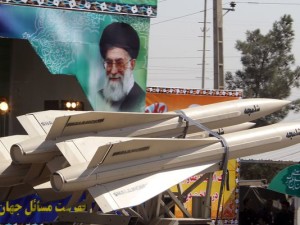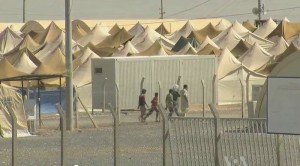Wars happen. When they do, generally the publics on both sides of the conflict line rally around the flag. Patriotism, flag and country enable governments to send their young people into battle with a willingness to die (and to kill). It is truly amazing how easy it is to rally the troops behind the leaders. Threats are perceived – usually based on genuine dangers, and then embellished by the politicians, who can never say for sure what the outcome will be.
The ex-generals line up on television to beat the drums of war and to issue their warnings to the other side. Rarely are voices of caution and calls for alternatives to the use of force heard. The “experts” take their turn escalating the mood and the readiness to “let the other side get what they deserve.” It is only after the war that critics are heard, while the public is licking its wounds and burying its dead. And then comes the lines of ex-generals and politicians who declare victory and issue more warnings to the other side – “they haven’t seen anything yet – wait until the next time!”
This time it seems that Russia, the regional overseer, managed to contain the volatile flare-up that occurred last weekend with the breach of Israeli airspace by a Iranian drone launched from Syria. Until now, Israel has pretty much enjoyed a free hand in the skies over Lebanon and Syria – breaching their airspace and sovereignty at will. Tens of attacks in Syria have been attributed to Israel, and not denied, over the past years.
Israel has maintained a policy that it would not allow the transfer of rockets and other weapons from Iran to Hezbollah. Israel has also declared that it would not allow the Golan Heights on the Syrian side to become a base of operations for Iran. Against all the Israeli attacks there was virtually no Syrian or Hezbollah resistance. Up until now Iran did not interfere directly, and communication with Russia, and good luck, have prevented altercations with Russian troops on the ground.
Yet, even with a free hand, Israel is deterred from launching an overt, full-scale offensive against Hezbollah and Syria and of course Iran, because of mutable factors including the Russian presence on the ground (and security understandings between Russia and Israel) and over 100,000 Hezbollah rockets pointed at Israel with the ability, apparently, to hit anywhere in the country.
Hezbollah is also deterred from launching attacks at Israel following the Second Lebanon War of 2006. Israel and Iran have also maintained a balance of deterrence that seems now to have been tested. Iran’s decision to send an advanced drone into Israel’s airspace is certainly testing the boundaries. Israel’s forceful attack against Syrian air defenses and, as reported, also Iranian manned air defense systems are also tests of boundaries.
The downing of an Israeli F-16 fighter jet, after more than 30 years since the last Israeli warplane was downed, has emboldened, at least in words, and impressions, the Syrian and Iranian sides – perhaps Hezbollah as well. But because the stakes are so high all around, and because the entire world is still very unclear about what US President Donald Trump can and will do, in the absence of any coherent American foreign policy, and because Russian President Vladimir Putin seems to be an effective warlord, mutual deterrence will probably be maintained – for now.
The actions and rhetoric we’re hearing are very much part of a “caveman” mentality, lacking any diplomatic sophistication. This is believed to be the culture of the Middle East. We have heard it so many times: if you show any sign of weakness in this region, you are dead. Anything less than threatening “fire and fury such as the world has never seen” is perceived as weakness. The Israeli expression of “fire and fury” is “the landlord has gone crazy.”
Hezbollah leader Hassan Nasrallah has his own special rhetoric as well (“Haifa and beyond,” “Dimona,” etc.) that easily adds more fuel to the fire. Israeli politicians are now expressing that the next war in the north will not be between Israel and Hezbollah, but between Israel and the Lebanese state – so that all of the people of Lebanon have been warned (as if they didn’t understand that from the war of 2006 – which was then against the Lebanese state and not just against Hezbollah).
It is true that Israel must maintain its strong position and qualitative edge. This is essential for Israel’s safety and security. I suppose the bellicose grandstanding of Israel’s government officials is at times necessary. For years now, I have been waiting for another voice to come from senior Israeli government officials – a voice that would speak out to our neighbors in the region in a different tone, without reservations and conditions, a voice for peace, recognition, mutual security and stability.
If only we had a foreign minister who was a diplomat or understood diplomacy, or a minister for regional cooperation who actually fulfilled the title of the office (the one we have is only a puppet spokesperson of the prime minister). If only we had leaders from the opposition presenting alternatives to the public – but the opposition leaders in Israel are competing over who is more prepared to use brute force and the power of the mighty Israeli army and air force. When the only language heard in the region is one of force, power and violence, how can we ever expect to break out of the shackles of the conflict?
We know that there are millions of people in Iran who do not support the regime – perhaps even a majority of Iranians. They have little reason to hate Israel. The same is true for Lebanon and probably for Syria as well – where many have witnessed the humanitarian aid provided by Israel to hundreds of Syrians who have been wounded and treated in Israeli hospitals. It is true that no real peace will be established between Israel and its Arab and Muslim neighbors without entering into a genuine Israeli-Palestinian peace process, but there is a lot of room to begin to change the climate at the level of the peoples of this region. The overwhelming majority of Israelis sincerely wish no harm to their Arab and Muslim neighbors – and the reverse is also true.
Words matter. In our online world the words of leaders are heard in real time beyond borders and are taken seriously. Words shape reality, and our developing regional reality is very dangerous. Responsible leaders must not only flex their muscles and beat their drums, they must first and foremost prevent the next war. Deterrence is often one kind of fix, but its longevity is usually quite limited. There are always other options toward reaching out and creating a more positive regional reality. How much has that been genuinely tried and tested? Not very much, I fear.


